UZBEKISTAN: NATIONAL CONSULTATIONS ON WATER RESOURCES ARE ON THE UNITED NATIONS POST-2015 DEVELOPMENT AGENDA
The National Water Partnership of Uzbekistan held a roundtable with the participation of key stakeholders in the Training Center of the Interstate Commission for Water Coordination (partner of GWP CACENA) in Tashkent on March 12, 2014.
The roundtable participants were welcomed by Mr. Ravshan Mamutov, Deputy Head of the Chief Water Management Department of the Ministry of Agriculture and Water Resources of the Republic of Uzbekistan. In his speech, he noted that Uzbekistan to a considerable degree relies on its neighbors in the matter of required water supply from surface water sources, as only 15% of all the water resources used in the country form in its territory. This fact highlights the risks in ensuring water for future generations in Uzbekistan. Other challenges in assured access to water in Uzbekistan are as follows:
- imperfect water resources management from the institutional point of view and lack of long-range planning
- lack of coordinated legal framework for the water resources management at the international (transboundary) and national levels
- imperfect information support in the water sector
- aging of the water management infrastructure and, consequently, inefficient water use (particularly in the irrigated agriculture accounting for roughly 90% of the total water consumption).
Deputy Director of the Scientific Information Center of the Interstate Commission for Water Coordination (SIC ICWC), Regional Director of GWP CACENA, Mr. V.I. Sokolov informed the roundtable participants that the Uzbekistan Institute of Forecasting and Macroeconomic Research was developing a concept of the Vision “Uzbekistan-2030”, the purpose of which is to suggest steps for propelling Uzbekistan to the level of industrially advanced countries and increase in per-capita income by 2030. In the source of this forward-looking work, the following focus areas of the Vision are particularly significant for the water sector:
- formation of institutional background for the development of competitive environment as a key factor for improving the performance of economy and accelerating structural reforms (in the agricultural and water sectors as well)
- energetic and ecological sustainability: guidelines for the transition to resource-efficient growth model
- long-range social sustainability: guidelines for the reformation of the social policy system
- spatial aspects of the building of regions’ industrial capacity from the standpoint of provision these regions with water resources.
Prof. V.A. Dukhovny, Director of SIC ICWC, turned to the roundtable participants for voicing their opinions and giving recommendations for the mainstreaming of promising elaborations for efficient development of the Uzbekistan water sector within the scope of the works started under the Vision “Uzbekistan-2030”. The guideline for improving sustainable development should be based on a broad program for controlling unproductive water losses at different levels of the water management and use system. The main task is to establish a system of legal liability of all system’s stakeholders.
The Deputy Chairman of the Board of the Uzbekistan Ecology Movement Mr. Saidrasul Sanginov noted that serious issues are associated with the Aral Sea and its vicinity problems. “Today, s challenging range of not only environmental, but also social and economic as well as demographic problems with global consequences have arisen in the Priaralie region”, – spoke the President of the Republic of Uzbekistan at a United Nations Plenary Meeting (New-York, 20 September 2010).
The Government of Uzbekistan believes that the states located ion the basins of transboundary rivers can and must contribute to regional cooperation in the water sector. Such interaction is a key to the development and reaching mutually acceptable agreements on sustainable use of transboundary water resources. Adhering to rules of international law, Uzbekistan is one of the three Central Asian countries being parties to United Nations international conventions that govern transboundary river issues.
The Head of the Department of Regional Water Supply System of the Uzbek Agency “Uzkommunkhizmat” Mr. T. Khaydarov represented the Program for Comprehensive Development and Modernization of Drinking Water Supply and Sewerage Systems in the Republic of Uzbekistan for the period until 2020. The Program includes:
- prediction and review of resources separately for each drinking water source with a view of ensuring reliable and regular water supply
- wide coverage of rural settlements by water supply systems, including residential districts being constructed according to standard plans
- formation and implementation of projects in the field of sanitation, first of all in the cities where water supply systems have already been reconstructed
- completion of the installation of water use metering devices; implementation of automated consumer feedback system
- further improvement of the legal and institutional sector management systems; optimization of the organizational structure of local water supply and sewerage enterprises
- development of the Concept of Comprehensive Development and Modernization of Drinking Water Supply and Sewerage Systems by 2035.
Expected efficiency of the Program implementation is shown in the diagrams below:


Representatives of the Uzbek Hydrometeorological Data Research Institute under State Center of Hydrometeorological Service “Uzgidromet” Mr. B. Tsarev and Ms. N. Karandaeva introduced the following guidelines for the development of hydrometeorological service to the roundtable participants:
- development and improvement of the national hydrometeorological survey system
- hydrometeorological support to branches of economy, population, and armed forces of the Republic of Uzbekistan
- formation and establishment of the national hydrometeorological fund of data, national fund of data on environmental pollution, and state recording of surface waters
- coordination of all the works for the creation and maintaining state water-resources inventory
- carrying out of regular monitoring over pollution of atmospheric air, soil, surface water, and occurrence and development of natural hydrometeorological phenomena
- performance of research works for improving short-range and long-range forecast of weather, water availability, and climate change.
In his report, the Deputy Director of the Republican Association “Uzvodremecology” Mr. A.A. Djalalov highlighted the importance of such areas of focus for Uzbekistan water specialists as public awareness and improving water culture among the population as well as enhancing sharing of knowledge and best practice in the sphere of water resources management.
Representatives of science and education, Prof. Sh.Kh. Rakhimov, Director of the Research Institute of Irrigation and Water Problems under the Tashkent Institute of Irrigation and Melioration, and Prof. A.T. Salokhiddinov, Head of a Chair of the Tashkent Institute of Irrigation and Melioration, mentioned of the significance of training of skilled personnel for the republican water industry and further building of their scientific capacity. The roundtable participants were informed that the Cabinet of Ministers had approved the issue of a new academic and research “Irrigation and Reclamation” which was to become quarterly issued from 2014. To eradicate water illiteracy a special program and new standards are needed for rating specialist skill.
Representatives of non-government organizations and mass media Mr. I.Kh. Domulajonov, Non-Governmental & Non-Profit Organization “For Clean Fergana”, Ms. N.V. Shulepina, Chief Editor of the Web Portal SREDA.UZ, Ò.À. Sultanov, Director of the Regional Environmental Center for Central Asia (CAREC) Office in Uzbekistan. They made a note of such issues as extended access to reliable information and communication means, which are supposed to be addressed within long-range works in the water sector. Information awareness will contribute to more effective of water problems as well as raising education level.
The roundtable participants expressed their gratitude to GWP CACENA for the organization of that event and approved the idea to regularly hold such events in future. Such a platform for consultations is very significant in the Vision “Uzbekistan-2030” development process.
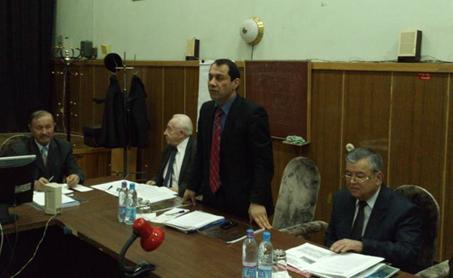
Mr. R. Mamutov, Deputy Head of the Chief Water Management Department of the Ministry of Agriculture and Water Resources of the Republic of Uzbekistan, to welcome the participants
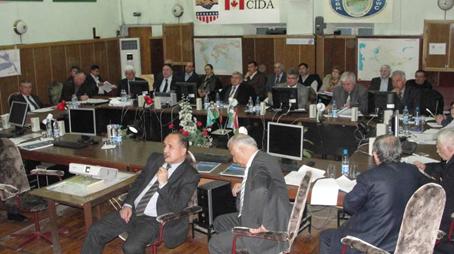
Working situations during the national consultations in the ICWC Training Center on 12 March 2014
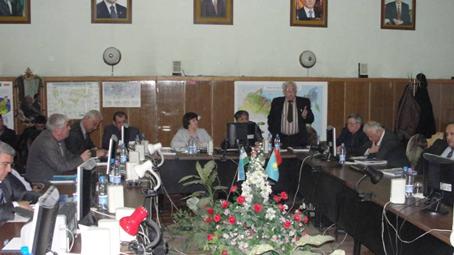
The representative of the Uzbek Hydrometeorological Data Research Institute under State Center of Hydrometeorological Service “Uzgidromet” Mr. B. Tsarev to take the floor
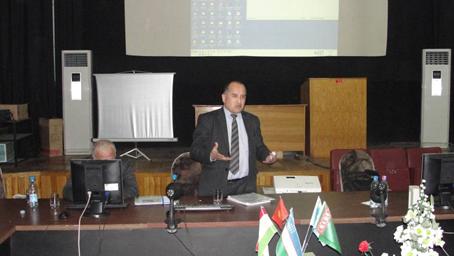
Prof. A.T. Salokhiddinov, Head of a Chair of the Tashkent Institute of Irrigation and Melioration, to speak about the problems related to training personnel for the water sector of the republic
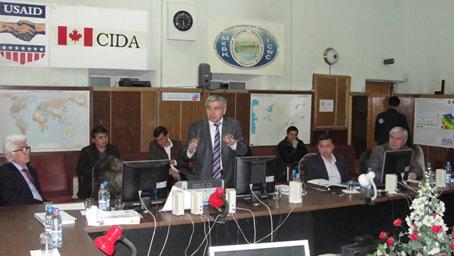
Director of the CAREC Office in Uzbekistan Mr. Ò.À. Sultanov
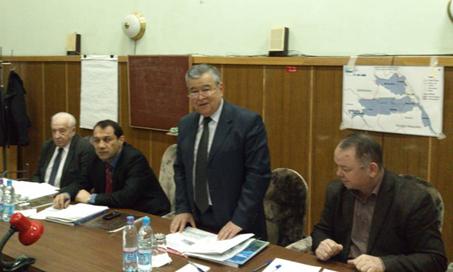
Prof. Sh.Kh. Rakhimov, Director of the Research Institute of Irrigation and Water Problems under the Tashkent Institute of Irrigation and Melioration
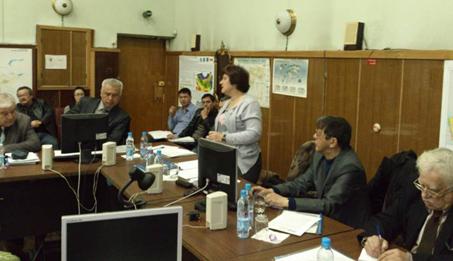
The leading specialist of the Uzbek Hydrometeorological Data Research Institute Ms. N.M. Karandaeva to answer questions
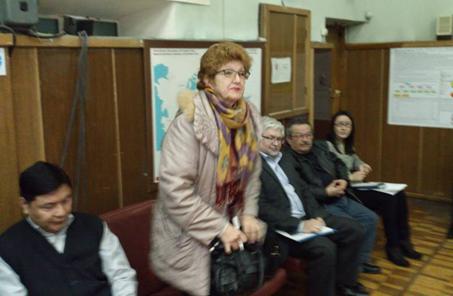
Chief Editor of the Web Portal SREDA.UZ Ms. N.V. Shulepina
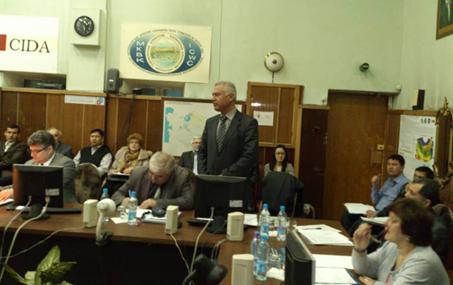
Head of a Department of the Uzbekistan State Committee for Nature Conservation Mr. Babakhodjaev
|